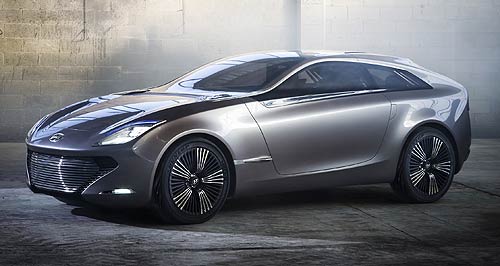Future models - Hyundai - IONIQGeneva show: Hyundai hatches sporty i-oniqNew thinking: The muscular, coupe-like i-oniq hatch showcases some of Hyundai’s latest design and powertrain engineering work. Range-extender hybrid sports hatch from Hyundai emerges ahead of Geneva world debut2 Mar 2012 By TERRY MARTIN AFTER issuing a teaser image almost three months ago, Hyundai has finally taken the covers off its plug-in hybrid sports hatchback concept – the ‘i-oniq’ – which will make its world premiere at the Geneva motor show next week. Described as the “most powerful demonstration of Hyundai’s ‘new thinking’ to date”, the striking coupe-inspired hatch showcases some of the South Korean manufacturer’s latest design and engineering work, including a range-extending plug-in petrol-electric powertrain. In a move away from Hyundai’s sharply defined ‘fluidic sculpture’ design language that was first shown on the 2009 ix-onic concept and is now permeating the brand’s new-generation models, including the forthcoming i30 hatch, the i-oniq instead combines “gentle feature lines and muscular surface treatment”. The concept clearly aims to further emphasise Hyundai’s more premium-oriented and sporting brand positioning, and also carries some interesting individual design elements such as a ‘penthouse roof’ and LED headlights. Full details were still to be provided at the time of writing, but Hyundai has revealed that the i-oniq is 4400mm long and has space for four occupants in a cabin that places a heavy emphasis on the driver. This driver focus is evident through a mass of hi-tech equipment in the instruments and controls, which reflect “contemporary and future premium consumer electronics technology”. Offsetting this to an extent, the interior designers have also created a “lounge-style” space, using sculpted surfaces inspired by musical instruments to contrast with the sports-focused cockpit. The powertrain combines a 1.0-litre three-cylinder petrol engine with an 80kW electric motor/generator, which draws from a lithium-ion battery pack. Hyundai claims the vehicle has an excellent electric-only range of 120km, while assistance from the petrol engine can extend the range to 700km – all the while producing just 45g/km of CO2. The i-oniq’s size and powertrain position it as a sporting alternative to the new wave of plug-in hybrids such as General Motors’ Volt, which uses a 1.4-litre four-cylinder engine to charge a 16kW/h lithium-ion battery pack and enable the vehicle to travel up to 600km – or around 60km in pure electric mode. Hyundai is well advanced on plug-in hybrid powertrain development, having shown a number of concepts in recent years, including the 2009 Blue-Will that, with a 1.6-litre GDI four-cylinder petrol engine and 100kW electric motor, was conceptually similar to the Volt and Toyota’s Prius Plug-In. The company also presented a smaller (non-plug-in) hybrid system based on a 1.0-litre three-cylinder GDI turbo-petrol engine and a small 5kW integrated starter motor/alternator in the 2009 ix-Metro hybrid. Hyundai Motor Europe senior vice-president and COO Allan Rushforth said: “The i-oniq concept has been created to reflect the new thinking that runs through the Hyundai brand. “It has a bold design, inside and out, that provokes contemplation on the future of automotive possibilities, and a powertrain that highlights one of the ways in which we could power future products – wrapped in a package that exudes premium qualities.”  Read more |
Click to shareHyundai modelsResearch Hyundai Motor industry news |
















Facebook Twitter Instagram